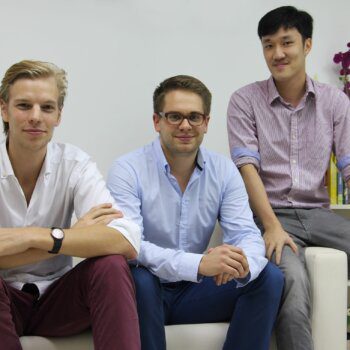From pharmaceuticals to petrochemical processes: Newcomer companies and investors and investors alike are setting their sights on science. How the start-up scene moves beyond the mobile apps bubble…
For the last two years Silicon Valley analysts and venture capitalists are anticipating the burst of yet another bubble. This time, under the risk are the mobile start-ups which constitute the biggest share of the market. Out of 50 companies listed in Forbes’ “the hottest startup of 2015” (by valuation) only six companies are based on innovations in other-than-mobile area, one company provide cleaning services, while the rest are diverse mobile apps.
Meanwhile many products listed can be barely called innovative. A significant proportion of the listed start-ups are texting apps, apps for people search (starting from business partners to life partners) or delivery services. While those services can definitely facilitate one’s life, in general they differ from their predecessors by only a narrower audience.
Many venture investors expect stagnation if not decrease on the markets, which is why they start to transfer their capitals from start-ups offering customers software to start-ups offering specific solutions for existing businesses. Such companies are expected to demonstrate more stability in the near future.
The Market for Mobile Apps Might be Saturated
Back in 2012 a talented entrepreneur could walk into a venture capitalist’s office, say his startup was a mobile-first solution for pretty much any problem (payments! photos! blogging!), and walk out with a good-size seed investment. “That pitch was enough to get going,” says Roelof Botha, a partner with VC firm Sequoia Capital. “It’s not enough anymore.”
“I think investors are bored with investing in another messaging app. And our idea is crazy enough that it might just work. ”, has declared in 2014 Nadir Bagaveyev a founder of a start-up using 3-D printers to make rocket engines. By 2016 the company attracted investors funding sufficient to launch its first rocket.
Pharma and Biotech Start-Ups in High Demand
Currently the most successful science-based start-ups are the companies offering innovative solutions in the field of pharmaceuticals and biotechnologies. It’s noteworthy that despite the previous revelations and even judicial proceedings the list of the most expensive start-ups still includes Theranos, blood analyzing laboratory, whose story did not descend from the main pages of the global leading media from 2014.
It first amazed the audience with its fantastic take-off and then with its collapse. One of the crucial parts of the success story of this start-up is its fundamental difference from the majority of the services produced in the Silicon Valley. Unlike the others, it was not a story of yet another beautiful gadget for communication or mobile app, but the story of the scientific idea which intended to conquer the world.
The great success stories in other scientific areas are now happening on occasional basis. However certain facts allow to predict that the situation is to change soon. One of such factors is growing interest among the big corporations to attract innovative solutions from outside to develop their businesses.
Given the accelerating pace of scientific and technological development of the world, the activities of internal R & D departments are often turn to be insufficient to ensure stable development of innovative business. Outsourcing of the R&D may become the efficient mechanism to stimulate the growth of the company. And high-tech start-up can certainly benefit from it.
Start-Up Technology for the Petro-Business
In December, 2016 world leading companies in the field of gas processing, petrochemicals and chemicals announced their intentions to enforce their R&D capacities by attracting start-ups. 3M, AkzoNobel, BASF, The Dow Chemical Company, DuPont, Henkel, Honeywell UOP, LG Chem, Linde, Sibur, Solvay and Technip together created a global stage for startups and investors.
“The petrochemicals industry can and must rely on the potential of open innovations to facilitate further inventions and implementation of new solutions in all major application areas, from construction and medicine to packaging and 3D printing. Thanks to the participation of international partners, IQ-CHem is now the largest global project within the industry which attracts innovative solutions and provides for their implementation into practice,” said Vasily Nomokonov, Executive Director of Sibur, a company which coordinates the project.
Positive Experience in Chemicals and Beyond
Some of the listed companies have already gained positive experience in working with start-ups which may have driven them to elaborate a systemic approach to attract innovative companies.
At the beginning of 2016, SIBUR and RRT Global start-up reached an agreement to build a pilot plant for isomerization based on RRT Global technologies in Sibur’s Industrial Park SIBUR “Tolyattisintez”. According to Oleg Giyazov, co-founder and CEO of RRT Global cooperation with a large corporation bring significant advantages to his company.
“By cooperation with Sibur we get a huge industrial experience that enables us to develop technologies and solutions better fitted to the market demand. This advantage is often not given due attention, but we, on the contrary, see significant opportunities in it. Currently, RRT Global cooperates with several companies around the world” he said.
Another petrochemical leader BASF enjoys successful cooperation with Genomatica start-up. In 2013 BASF started the production of 1,4-butanediol based on renewable feedstock (renewable BDO) using Genomatica’s patented process and in 2015 the license was expanded to the Asian market.
Unlike traditional forms of cooperation between a start-up and a venture capitalist, a cooperation between start-up and a relevant corporation allows to minimize the risks associated with investing in a potentially promising idea where the key word is “potential” (but not “guaranteed”). While delivering services in the same field as the start-up the corporation gets an opportunity to more effectively and accurately estimate the market value of an innovative idea and to support its implementation.
Structural Changes Ahead: Outlines of A Coming Market
In the short term prospective, possibly in 2017, the global start-up market will face structural changes – both in terms of start-ups professional orientation and of funding mechanism. In the future science-based start-ups will dominate the market and will change our lives at a deeper level than the way of sending a text message or searching the restaurant for an evening meal. To be more concise this is already happening in the pharmaceutical industry, and the other scientific areas are to follow.
_________________________________________________
About the Author
This article was written by Dominik Stephan of Process Worldwide. See more.





























